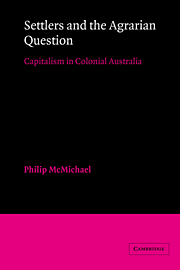Book contents
- Frontmatter
- Contents
- List of tables
- Preface
- 1 The social structure of British hegemony
- PART I THE COLONIAL ECONOMY ENTERS THE WORLD MARKET (1788–1830)
- PART II THE SQUATTING PHASE OF PASTORALISM (1830s AND 1840s)
- PART III CONFRONTING THE AGRARIAN QUESTION (1840–1900)
- 8 The 1840s crisis and social transition
- 9 Foundations of the agrarian question
- 10 State formation and transformation of the landed economy
- Conclusion
- APPENDIXES
- References
- Index
9 - Foundations of the agrarian question
Published online by Cambridge University Press: 18 December 2009
- Frontmatter
- Contents
- List of tables
- Preface
- 1 The social structure of British hegemony
- PART I THE COLONIAL ECONOMY ENTERS THE WORLD MARKET (1788–1830)
- PART II THE SQUATTING PHASE OF PASTORALISM (1830s AND 1840s)
- PART III CONFRONTING THE AGRARIAN QUESTION (1840–1900)
- 8 The 1840s crisis and social transition
- 9 Foundations of the agrarian question
- 10 State formation and transformation of the landed economy
- Conclusion
- APPENDIXES
- References
- Index
Summary
INTRODUCTION
The 1840s crisis in the pastoral economy precipitated the colonial agrarian question – an extended social conflict over land settlement patterns that reshaped colonial society during the second half of the nineteenth century. Although the formal solution to the agrarian question was the land legislation of the 1860s (and beyond), the social divisions over the character of the landed economy emerged during the recovery from the crisis. During the 1840s there were three main developments concerning the role of landed property in the colonial economy and society.
Political maneuvering by the large squatters to consolidate their form of economy and their political power in colonial Australia.
A growing perception, following the crisis, of the vulnerability of the staple economy and the emergence of an alternative concept of development involving economic diversification.
An expanding social base for the groups that held this concept as a consequence of the rationalization of the colonial economy following the crisis. (This rationalization was in fact a turning point in the form of capital accumulation in the colonial economy.)
These economic and political developments anticipated the flowering of the agrarian question in the gold rushes of the 1850s, when gold-immigrant radicalism accelerated the opposition to squatting.
Alongside these developments, and very much informed by them, was the gathering political momentum toward colonial self-government. From the settlers' viewpoint, the control of the disposal of Crown land and revenues from sales underlay the demand for political independence. However, the question of who should benefit shaped the course and tenor of agitation for self-government.
- Type
- Chapter
- Information
- Settlers and the Agrarian QuestionCapitalism in Colonial Australia, pp. 191 - 214Publisher: Cambridge University PressPrint publication year: 1984



